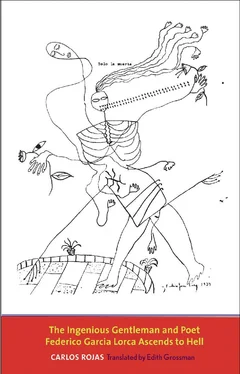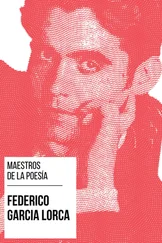“Do you understand now why I can’t publish the original you’ve returned to me?” Sandro asked the stranger as he turned off the tape recorder.
“Yes, yes, I believe I understand.”
“An unknown destiny, about which I am totally ignorant except for the fact that it transcended me, obliged me to write this book, born of a dream, so that Marina would compose her sonata. I was a means, not an end, and since the sonata is finished, my novel, we’ll call it that in order to call it something, represents absolutely nothing.”
“But that’s no reason to destroy it.”
“Perhaps not. Some bad habits of vanity oblige me to agree with you about this not especially transcendent detail. Which is why I’d like it to be published under your name and dedicated to Marina and me. You won’t refuse, will you?”
“And suppose I do?”
“Then I’d burn it in the fireplace when the first snow falls. The one Marina announced would come very soon.”
Marina didn’t seem to be listening to them. Bent over, arms extended, her hands were crossed between her knees. Her hair fell over her forehead and cheeks, hiding her face, as if she were a penitent forgetful of the faults she had committed or preparing to atone for others she hadn’t committed yet. One would say she was as distant from the woman who composed the piano sonata as if one of them had never existed.
“All right,” the visitor conceded. “I’ll do as you wish and publish the original as mine.” He picked up the bound typed sheets and slipped them into his leather briefcase, then closed it carefully. He noticed his hands. They were identical to Sandro Vasari’s.
“You won’t forget to dedicate the book to us when it’s published,” Sandro insisted.
“No, I won’t forget.”
“Can we count on it?”
“You can count on it.” The stranger shrugged.
“I feel much better now,” Sandro replied. His irony was painful and indecisive, as if gliding along the edge of a barber’s razor.
“I don’t.” The other man shook his head. “In a way I understand or would like to understand your reasons for not publishing the work under your own name. On the other hand … ”
“On the other hand … ”
“I’d like to know what you’ll do with your sonata, Marina. Did both of you decide to destroy it too?”
He didn’t seem to dare look at her, as if he didn’t expect an answer from her either. Marina lifted her head and made a vague gesture as she looked at him with her gray eyes. Then she began to hum, almost mumbling, a strange melody completely unlike the sonata.
“Destroying it or publishing it would be two faces of the same aberration,” Sandro replied. “The sonata is ours and will live with us as long as we live. If you’ll forgive the obligatory rhetoric of the circumstance.”
“You’re forgiven, even though I don’t understand you.”
“I assumed that too, because you never understood us, though Marina came to believe we lacked existence outside your dreams and your books.”
“Sometimes I still think that,” murmured Marina.
“I already told you my original was nothing more or less than an inadvertent way for her to compose the sonata,” Sandro continued, addressing the stranger without listening to her. “Soon after you realize what has happened, you’ll become aware of an erudite consequence. It’s logical and in a sense inevitable that Marina should write this music, as it is also reasonable she would need my manuscript to conceive it. Said another way, and this time so you’ll understand us, the sonata is the child of flesh and blood we’ll never be able to have.”
“That occurred to me and I had to reject it. On one hand it sounds like a prosopopoeia, on the other it’s too reasonable. The prosopopoeia is an affectation and therefore doesn’t tally with the truth. The excess of reason is no more and no less … ” He hesitated a few moments and then repeated in a loud voice, “ … no more and no less than madness.”
“It’s true!” Sandro confirmed, struggling to contain his excitement. “It’s true! Don’t you see?”
“Sincerely, I don’t.”
“Then listen to me. Marina is sick and her illness has a name not recorded in treatises on the soul because it bears your own surname. Perhaps you’re correct when you claim she suffers from an excess of reason or filthy logic, as Unamuno would say. You governed our lives from the day you chose to introduce us at the university while monarchists and Falangistas, two species that are almost extinct today, were bludgeoning one another in front of Don Juan’s first statement against Franco, which was tacked on the bulletin board. I, always prone to reticence, recounted to you in detail, and in spite of myself, our moments of love in the bedroom beneath the Vallcarca Bridge … ”
“Nobody forced you to reveal anything,” the new arrival observed with a note of impatience at the back of his voice. “This is all absurd, Sandro, even if it is true.”
“Perhaps there’s nothing more absurd than truth itself. Marina came to believe that someone, perhaps you, was watching us from behind the mirror that the years had turned ashen black. I’d say that what happened was different and of course more inexplicable. In a way I’ll never understand, because thank God I’m not a writer or a dramatist, before my revelations you already knew everything I was going to tell you, including the fact of my confession.”
“ The act of love is identical to the act of lust , says Graham Greene in one of his exemplary novels. Even a blind man like Borges would add that any couple in the act of love, or of simple pleasure, is every couple in any of those acts.”
“I care very little about what those old hypocrites say. I’ll save you another recounting of the abortion on Montcada Street, though I can’t hide from you that even then I thought it had been anticipated by your mediocre fantasy, with the two of us acting as protagonists. We’ll forget many years to return to those of the death throes and passing of the Caudillo Franco, when you reunited Marina and me and commissioned me to write a book on the life and painting of Goya.”
“Now you’ll say I did it knowing you wouldn’t write it.”
“You did it knowing I wouldn’t write it, though naturally you did publish another book about my inability to finish mine.”
“Sandro, I’m more a master of both your destinies than I am of my own.”
“Possibly you’re less the master of your own than of ours because you too submit to another’s will without knowing it. The fact is I don’t care, because ever since that distant day when you joined the three of us in the courtyard of Arts and Letters, the case is ours only as it relates to me. Shall I go on?”
“If you like.”
“After I forgot about Goya, I dreamed about our murdered poet in hell, talked to Ruiz Alonso, and wrote this book, which I did finish and therefore give to you. Because it is all mine from beginning to end.” He rested his palm on the briefcase that contained the original, close to the hand of his visitor. From his orchestra seat, he was surprised again at the similarity between the hands of the two men. “I won’t hide from you that at times, as I was writing, I suspected I was your puppet again, your Doppelgänger with a different face. I told myself then: ‘ … Marina’s right. He dreams I’m struggling to move this book forward. It never would’ve occurred to me to begin it, since I never had any great interest in the poetry of that unfortunate man, though it’s still applauded in lecture halls, on stages, and profusely printed in textbooks so many years after his death.”’
“Why did you finish it then?”
“Inadvertently, so that Marina would compose her music. I think I told you this before. When I heard the entire sonata, after having listened to fragments, not paying much attention, I understood it was our child and our freedom because you had lost all power over us. For the first time we counted on something of ours created behind your back. Something that would free us forever and transform us into our own and only reason for being.”
Читать дальше












